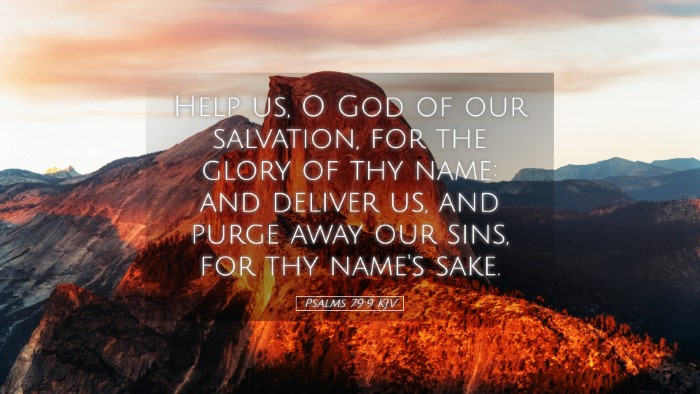Psalms 79:9 - A Commentary
Verse Context: Psalms 79:9 reads: "Help us, O God of our salvation, for the glory of your name; deliver us, and atone for our sins, for your name's sake!" This verse encapsulates a profound appeal for divine assistance in the face of destruction, emphasizing God’s glory and the importance of His name.
Overview and Historical Context
This Psalm is attributed to Asaph and reflects a time of crisis for the nation of Israel, likely after the Babylonian conquest. The people are mourning their situation, having experienced devastation and loss. The cry for help resonates deeply as they implore God to act not only to rescue them but also to restore His honor among the nations.
Key Themes
- Divine Salvation: The request for help highlights the belief that only God can provide true salvation.
- God's Glory: The psalmist appeals to God's reputation, suggesting that His glory is at stake.
- Atonement for Sin: The acknowledgment of sin is crucial, as it underlines the need for divine mercy.
- National Identity: This psalm reflects communal lament, showing how the fate of the people is intertwined with their relationship with God.
Commentary Insights
Matthew Henry’s Perspective
Matthew Henry emphasizes the significance of invoking God's mercy, highlighting that God is known as "the God of our salvation." He points out that the plea made here is rooted in a recognition of God's past deliverances. Henry suggests that this cry for help can serve as a model for believers today, illustrating reliance on God in times of trouble.
Albert Barnes' Insights
Albert Barnes elaborates on the importance of God's name in this verse. He notes that the psalmist connects their plight to divine reputation and the need for God's glory to be manifested. Barnes argues that when believers seek God’s intervention, it is not merely for personal or national reasons, but also to uphold the sanctity and honor of God’s name among the nations. He also discusses the allusion to atonement, reflecting on the significance of recognizing one's sinfulness before a holy God.
Adam Clarke’s Commentary
Adam Clarke focuses on the duality of the plea — both for deliverance and for atonement. He discusses the theological implications of acknowledging sin in the context of divine help. Clarke suggests that this acknowledgment is essential for restoration, as without recognizing one’s transgressions, true salvation cannot be attained. He also underlines that the urgency in the plea denotes a sincere depth of desperation and need for divine mercy in light of overwhelming circumstances.
Theological Implications
The plea for help and atonement presented in this verse underscores the relationship between divine mercy and human sinfulness. The psalmist not only acknowledges the gravity of national sins but also appeals to a God who is righteous and just. This establishes a foundation for understanding the need for reconciliation with God, presenting a holistic view of salvation that encompasses repentance.
Implications for Pastoral Care
For pastors, this Psalm can serve as a poignant reminder of the need for reliance on God during crises. The emphasis on seeking God’s honor encourages church leaders to frame their ministry in a way that glorifies God, ensuring that their congregants understand the importance of repentance and restoration in their spiritual walk.
Applications for Theologians and Scholars
The appeal to God’s glory provides rich material for theological discussions surrounding God's nature and purpose in the world. Scholars can explore the interplay between divine sovereignty and human responsibility as evidenced in the Psalm. The themes of collective sin and national lament offer avenues for examining contemporary issues within the church and society.
Conclusion
The cry for help in Psalms 79:9 is a profound testament to the human condition before a holy God. It serves as a model for both individual and collective petitions for mercy. As believers reflect on the themes of salvation and God's glory, they are challenged to consider their own lives in light of their need for atonement and the desire to glorify God in all circumstances.


